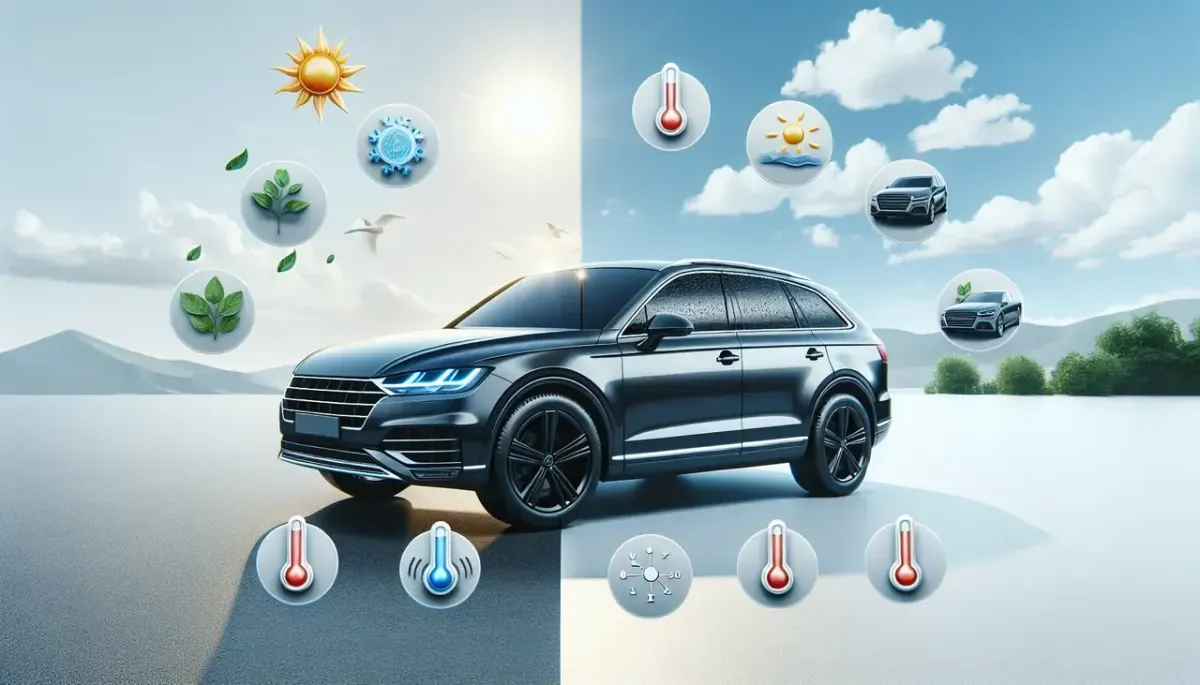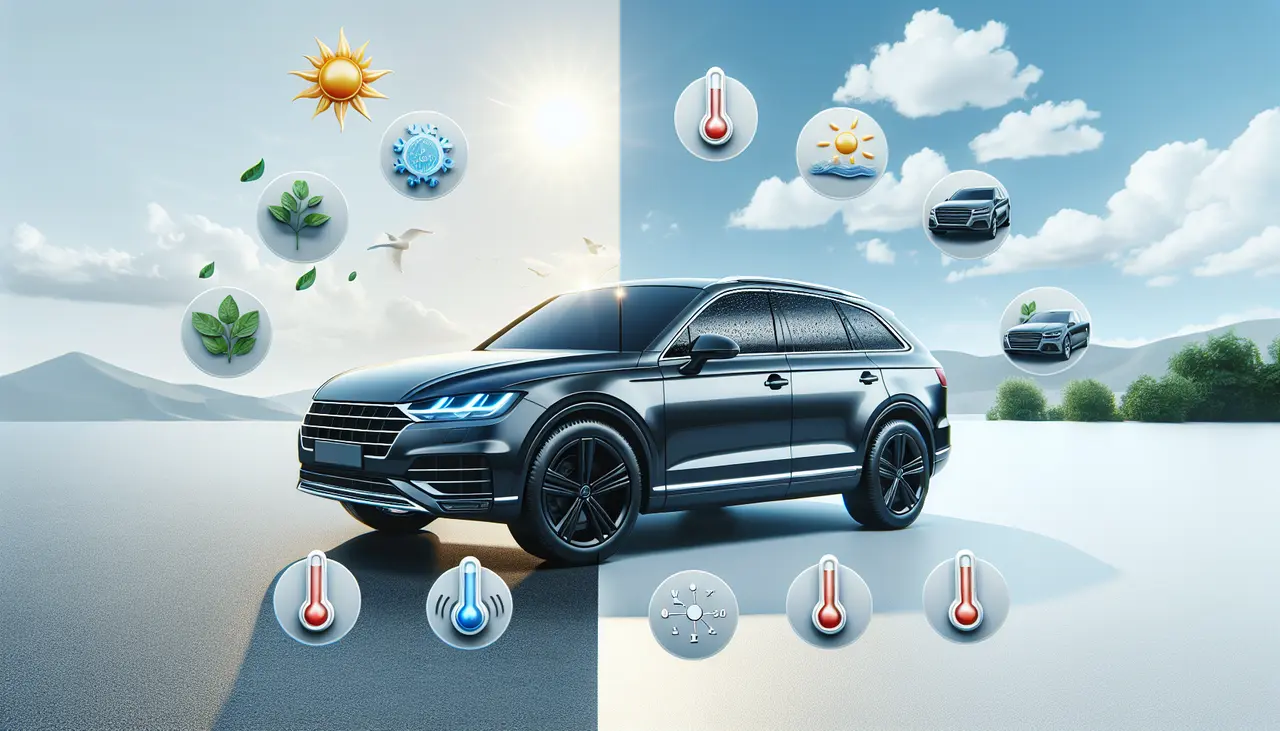My Awesome Detailer, LLC
My Awesome Detailer, LLC's Blog
"Auburn Alabama's #1 Resource for Ceramic Coating & Auto Detailing Information"

The Ultimate Guide to Tinted Windows Service: Benefits for Your Vehicle
Introduction to Window Tinting Services
Tinting car windows isn't just for style. It's a smart move with lots of benefits. Picture this: it's super hot outside, but inside your car, it's cooler. That's what window tinting does. It keeps out a lot of the sun's heat, making your drive comfy and saving on air conditioning costs. But there's more than just beating the heat. Tinted windows give you privacy, perfect for those solo concert moments in your car without curious eyes at red lights. They also add safety. If there's an accident, tinted windows can help keep broken glass in place, protecting you more. And don't forget about protection from the sun's UV rays. Window tints can block up to 99% of UV, keeping you and your car's interior from fading and damage. So, if you're looking to upgrade your car's look, stay cool, or want more privacy and safety, window tinting is a smart choice.
The Major Benefits of Tinting Your Vehicle's Windows
Tinted car windows aren't just for show; they're packed with perks. For starters, they cut down glare and UV rays, making your drive safer and comfier, especially on sunny days. They're also great for privacy and security. Dark windows deter nosy folks and thieves, keeping your belongings out of sight. Plus, they protect your car's interior from sun damage, keeping it looking new longer. And, they help keep your car cooler in the heat, saving you on air conditioning and fuel. So, you get comfort, savings, and your car stays in top shape. In short, window tinting boosts safety, privacy, and economy, while keeping your ride looking sharp.
Different Types of Tinting Films Available
Looking for window tinting? You've got options. Each type has its purpose, whether it’s blocking UV rays or boosting privacy. Let's break them down, simple and quick. Dyed Window Film: This is the wallet-friendly pick. It’s made by soaking the film in dye which then absorbs sunlight. It offers some privacy and cuts down on glare, though it's not the best for UV protection or keeping the car cool. Metalized Film: This one's packed with tiny metallic particles. They bounce back sunlight, helping reduce heat and UV exposure. It's tougher than the dyed version and sparkles from the outside. But, beware, it might mess with your phone and radio signal. Carbon Window Film: Step up your game with better UV and heat defense, minus the signal woes of metalized film. Plus, its matte look adds a touch of class to your ride. Ceramic Film: The top-tier choice. It blocks a hefty chunk of solar heat without needing to be dark. It shields against UV, doesn’t fade, and keeps your signals clear. It ticks all the boxes but expect to pay more. Each film type has its ups and downs. Your pick? It comes down to what matters most to you: price, longevity, looks, or performance.
How to Choose the Right Tint for Your Vehicle
Picking the perfect tint for your car is a mix of style, function, and rules. Not all tints fit every vehicle. First, figure out why you want the tint - is it for privacy, to shield the interior from the sun, to keep the car cool, or just for that cool vibe? Darker shades boost privacy and UV defense, but going too dark might break local laws. Different places have different rules about tint darkness. Always check local laws before deciding.
Next, think about the material of the tint. Dyed, metalized, carbon, and ceramic are popular types, each with its advantages. Dyed tints are budget-friendly and look great, but they may fade over time. Metalized tints reflect heat well but can interfere with phone and radio signals. Carbon tints offer excellent heat rejection without the signal interference, and ceramic tints are top-of-the-line for heat reduction, UV protection, and they don't fade or interfere with signals but are the most expensive.
Lastly, consider professional installation. A good installation ensures that the tint lasts longer and looks better, avoiding bubbling or peeling. It might cost more upfront, but it saves money by avoiding repairs down the line. In summary, choose a tint that balances your needs, abides by local laws, matches your budget, and is professionally installed for the best longevity and performance.
The Tinting Process: What to Expect
When you decide to get your vehicle's windows tinted, the process is straightforward but requires attention to detail. First, find a reputable service provider. A good tinting service will have solid reviews and clear examples of their work. Once you've chosen, you'll discuss the types of tint films available and their benefits, such as UV protection and privacy levels. The type of tint you select affects the cost and the installation time.
Next, your car is prepared for tinting. This involves thoroughly cleaning the windows to ensure no dirt or debris interferes with the film's adherence. The service provider will then measure and cut the tint film specifically for your vehicle's windows, ensuring a perfect fit.
The actual application involves carefully placing and smoothing out the film on the inside of the windows, ensuring there are no bubbles or wrinkles. This part requires skill and patience. After the film is applied, it needs time to dry, which can vary depending on the type of tint and weather conditions. Usually, you're looking at a drying time of about three days but could be longer.
Finally, there's a quality check. Your service provider should review the tint job with you, ensuring you're satisfied and inform you about the care and maintenance of your new tinted windows, like not rolling down your windows for a couple of days to allow the tint to set properly.
Throughout the process, communication with your service provider is key. Don't hesitate to ask questions or express any concerns. After all, you're investing in your vehicle's appearance and functionality.
Legal Considerations and Compliance
Tinting your car windows isn't a "pick any shade and go" situation. Each state sets its own tint darkness rules. It's a safety thing – for you and the cops. They need a clear view inside your car at stops. So, before jazzing up those windows, check your state's laws. They talk in VLT% or "visible light transmission," meaning the light your tint lets in. Some areas are tight, demanding 70% light in, others less so. Also, there's rules on which windows you can tint and the tint's reflectiveness. Got pre-tinted car windows? That counts in your tint % too. A quick tip: Post-tint, keep your compliance proof ready. Some places ask for it, helping avoid hassle during stops. Stay within the law to enjoy your tints hassle-free.
Maintenance Tips for Tinted Windows
Caring for tinted windows is straightforward but crucial to maintain their appearance and functionality. First up, wait a bit before cleaning. After getting your windows tinted, give them three to four days to dry and cure properly. Rushing to clean them can mess up the tint. When you do clean, steer clear of ammonia-based cleaners; they're the enemy of tinted windows and can cause the tint to degrade fast. Instead, use a soft cloth or a rubber squeegee with soapy water for a gentle, effective clean. Dry the windows with a clean, soft cloth to avoid scratches.
Also, watch out for sharp objects. The last thing your tint needs is a scratch from your seat belt's metal part or a pet's paw. Be mindful when loading and unloading things from your car. Regular checks for small scratches or bubbles are smart too. Catching issues early can save your tint. And remember, quality matters. If you ever need to retouch or replace your tint, invest in a good quality tint service to avoid frequent maintenance hassles. Stick to these tips, and your tinted windows will thank you by staying sleek and functional.
Cost Factors of Tinted Windows Service
Tinting your car windows doesn't have a one-size-fits-all price. It fluctuates, influenced by a few key factors. Firstly, your choice of tint matters a lot. Options range from the cheaper, basic films to pricier, high-quality ones that shield against more heat and UV rays. Secondly, your car's size plays a big role. Smaller cars are cheaper to tint than larger SUVs or trucks due to the greater amount of glass surface area. Location affects the cost too, with prices typically higher in big cities. Who tints your windows makes a difference as well. Experienced professionals charge more, reflecting their skill and the quality of their work. Prices might start around $200 for a simple job on a smaller car but can soar to $400 or more for superior tints on bigger vehicles, especially if you opt for a top-notch tinter. Remember, the quality of what you get usually matches what you pay. Keep these points in mind when planning your window tinting budget.
Common Myths About Tinted Windows Debunked
Many people have strong opinions about tinted windows, believing myths that don't hold up. First off, some say that tinted windows are only for making a car look more appealing. Sure, a sleek appearance is a benefit, but it’s far from the whole story. Tints do more than just turn heads; they offer privacy, keep your car cooler, and protect the interior from the sun’s harsh rays. Another common myth is that window tints make it too dark to see out of the car, especially at night. The truth is, tints come in a variety of shades and the right one will not impair your vision, day or night. It’s all about choosing the proper level of tinting. People also believe that window tinting is illegal. The reality? Laws do vary, but tinting itself is not illegal. Each state has its own rules about how dark or reflective tints can be, so it’s just about staying within those guidelines. Lastly, there’s a misconception that tints are outrageously expensive. While prices can range, there are options for nearly every budget. Investing in window tinting can even save you money down the line by reducing the need for air conditioning and preventing sun damage inside your vehicle. So, don’t let these myths steer you away from considering tinted windows— they offer far more benefits than you might think.
Conclusion: Enhancing Your Vehicle with Tinted Windows Service
Wrapping things up, tinting your car windows is more than a style boost—it's a savvy move for added comfort, privacy, and safety. Think of it: reduced glare, cooler temperatures inside, less visibility from the outside. Plus, in case of an accident, the tint can keep shattered glass in place, offering extra protection. And yes, it does make your ride look sharper, sure to turn heads. Choosing window tinting means not just elevating your car's look; you're choosing wisely for several advantages. Keep it straightforward, choose the best service, and savor the cool, secure, and private journey ahead.

My Awesome Detailer was founded with one mission: to bring elite-level vehicle protection and detailing to Auburn, AL and beyond.
Since day one, our focus has been delivering long-lasting paint enhancement, value retention, and top-tier appearance protection —with zero compromises.
We believe that true automotive care starts with clear communication and customized solutions, tailored to the specific needs of each vehicle and owner. From professional-grade ceramic coatings and self-healing paint protection film to precision paint correction and full-vehicle detailing, every service we offer is designed to elevate, protect, and preserve your investment.
At My Awesome Detailer, you don’t just get a clean car—you get long-term peace of mind and a finish worthy of a showroom spotlight.
Contact Info & Address
2709 Frederick Road, Opelika AL 36801
(334) 650-6499
Working hours
Monday: 8am-5pm
Tuesday: 8am- 5pm
Wednesday: 8am - 5pm
Thursday: 8am - 5pm
Friday: 8am - 5pm
Saturday: 8am-5pm
Sunday: Gone Fishin'
All Services by Appointment Only
Map
@ 2026 Copyright. MAD, LLC All rights reserved.
